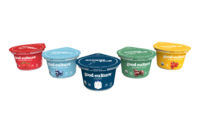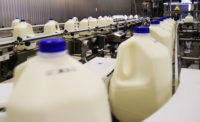South Woodstock, Vt.-based Vermont Farmstead Cheese Co. is known for its wide array of Old World cheeses. The company looked to Europe and the heritage of many of the world’s fine cheeses in order to find inspiration for its cheese lineup, which totals 17 across several types: Governor’s Cheddar, Farmstead Cheddar, AleHouse Cheddar, SugarHouse Edam, BrickHaus Tilsit, SmokeHouse Tilsit, Lille (Coulommiers), Angeline and WindsorDale.
All of its farmstead and artisanal cheeses are made in small batches at its 5,000-square-foot farm and creamery in South Woodstock, where it produces up to 300,000 pounds of cheese a year. Its farmstead milk comes from its own mixed herd of Holstein, Jersey, Ayrshire, Brown Swiss and Milking Shorthorn. The multibreed herd is a unique aspect, according to Sharon Huntley, director of marketing. This blend makes for exceptional milk with each breed contributing a different component for a unique combination for cheese, she said. Any other milk used for its artisanal cheeses is 100% Vermont milk from local farms.
“Most farms maintain a herd of the same breed,” Huntley said. “Because we had input from several dairy farmers and were partnering with others to create and organize our herd, the multibreed herd developed and became a key benefit to our milk quality.”
The company prides itself on the uniqueness of its cheeses. “We decided early on not to be a ‘me too’ cheese company, meaning that we weren’t just going to do another Vermont Cheddar like everyone else,” said Huntley.
So the company began making a soft ripened Coulommiers-style (instead of its more well-known cousin Brie), WindsorDale (based on a United Kingdom Wensleydale recipe), Tilsit (German-style), Edam (Dutch-style with Fenugreek seeds) and AleHouse Cheddar (made with Harpoon beer).
“Even our Cheddars are different since they are [made with] raw milk (not pasteurized) and farmstead (meaning made from milk on our own farm),” Huntley said.
The WindsorDale, a British-style hard cheese, is available in several flavors and varieties: blueberry, cranberry, sriracha, smoked, blue, cracked pepper, hot pepper and sage (a holiday favorite). The cheeses are aged six months before flavors are added. The sriracha flavor, which is a Thai-style hot spice, was added to the lineup specifically because of a trend the company was seeing on the market.
The company’s best-selling cheeses are the AleHouse Cheddar and Lille (Coulommiers). The Lille, which is described by Huntley as very creamy, is available in 3-and 4-pound wheels and a 7-ounce portion. The Angeline, a washed-rind cheese, is its newest, released this year. It has a buttery, earthy and creamy taste. The flavorful Tilsit, made in a 5-pound loaf, has a consistency similar to a Havarti, a medium-firm texture and is a great melting cheese, said Huntley.
Reinventing a cheese company
The road for this cheese company was anything but smooth, but that has made its success all the more special. In 2009 the farm (which at that time was a water buffalo farm and creamery, making mozzarella and yogurt) was threatened to have to close its doors due to cost pressures. The water buffalo were sold and the land put up for sale. Fearing that the land could fall completely out of agricultural use, 14 surrounding landowners and members of the South Woodstock community worked together to save the farm and purchase it as one unit. The group became the first community-owned dairy in the country, joining together to eventually launch Vermont Farmstead Cheese Co.
Since then, the company has reorganized into a stock company but almost all of the original owners are still involved. Today, the dairy farm has been transformed into an award-winning cheese company. Since shipping its first piece of cheese in June of 2011, Vermont Farmstead Cheese has received a total of 46 national awards to date, including three from The American Cheese Society. The company took second place at this year’s competition for its AleHouse Cheddar in the Cheddar with flavor added category.
Recently the company expanded by opening a 10,000-square-foot cut and wrap, aging and shipping facility in Windsor, Vt. This new location, which is near a major roadway, gives the cheesemaker more aging space and a more streamlined shipping process. This in turn has helped the company to keep up with the increasing demand for its cheese. The goal is to do further overhauling of its communication technology at this location for more efficient processing, according to Kent Underwood, president.
About 60% of the company’s business is for its own brand, with the remaining 40% dedicated to private label. The company sells mainly through distributors, marketing mostly on the East Coast. The cheeses can be found in specialty stores Stop and Shop, Shaws and Hannifords.
The customer base is typically female, primarily 35 to 55, food-conscious and quality-driven, who shop the specialty cheese sections in mainstream groceries, as well as specialty shops, according to Huntley.
In January of 2013, Vermont Farmstead purchased Whitney’s Castleton Crackers, Castleton, Vt., combining Vermont artisanal crackers and Vermont artisanal cheese under one umbrella.
Where there’s a will there’s a whey
Like many farms, the company focuses on using sustainable dairy practices whenever possible. This includes the use of its whey. The company works with local farmers who mix the whey in with the pig’s feed, which adds extra nutrients to their food. The company also mixes leftover whey in with its manure and spreads that across its farm. It also works with other local farmers who spread its manure as well. The company is looking into using the whey in dips and spreads to further recapture the product.
View related article: Fancy Cheeses take a Spotlight




